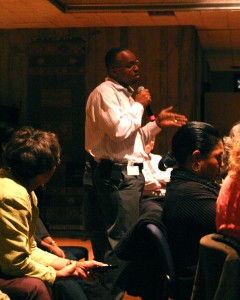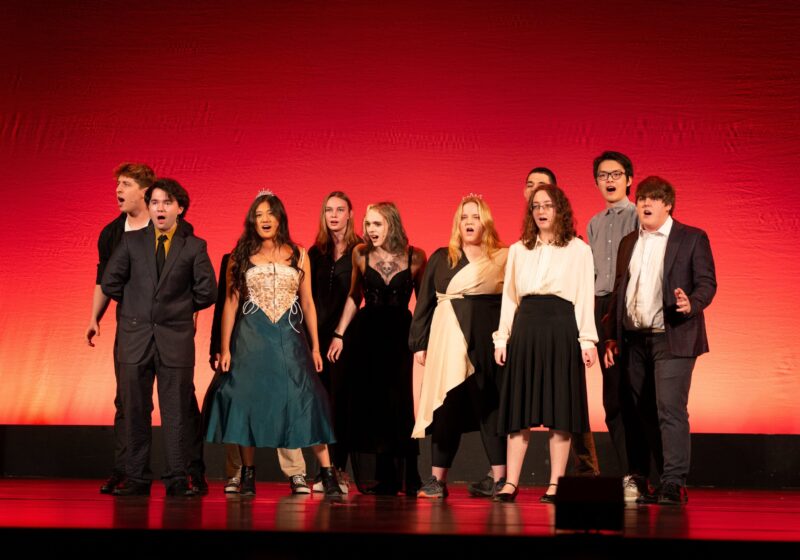
Nursing student Orlando Harris speaks about having a more diverse faculty. Photo courtesy of Melissa Goldin.
For those that think communication is dead,―that texting has replaced the spoken word and that e-mail is now a substitute for in-the-flesh interaction,―think again. On Tuesday, March 22, a number of students, faculty and other members of the University community gathered in the Interfaith Chapel on the River Campus for a community conversation to discuss concerns and solutions in relation to the campus climate.
This meeting was the second in a series discussing a diverse range of topics, including but not limited to security, feelings of inclusiveness and issues of race and diversity at UR. The discussions began in direct response to the shocking death of UR student Jeffrey Bordeaux, Jr. on Jan. 15, but have also led to dialogue on many other topics of concern.
“It initiated because of this tragedy … it’s still a tragedy and the first conversation was to help, to hear about that, [to] learn [and to] try to heal from [it],” Director of Minority Student Affairs Norman Burnett, who helped organize the event, said. “But … issues about community and climate were [also] raised — issues that some of us have been dealing with, but [that] maybe have taken a back seat.”
The first meeting took place on March 2 and was attended by more than 100 students, staff and faculty. It was a three-hour discussion in which many different topics of concern were raised, including the pain that was felt over the loss of two members of the UR community — Bordeaux and junior Daren Venable, who has withdrawn from the University and is out of jail on $50,000 cash bail. He will be tried for Bordeaux’s murder in April. Also discussed was the disappointment in how long it took the University to begin a community conversation, how some students do feel welcome or safe on the Fraternity Quad and how there is not enough access to alumni for minority students on campus.
“I think one of the alums … stated that some of the same issues … are the same issues [we had] 25 years ago. That was a little disconcerting to some people,― that we haven’t really moved further [along],” Burnett said.
“I think that these conversations are a forum in which students and staff get to talk openly about issues that are of concern to them,” Dean of the College Richard Feldman noted. “A thriving college community will be one in which we talk about the things that are hard to talk about, so I think to some extent we’re doing that.”
Students seemed appreciative of this chance to have their voices heard.
“I came to the first conversation, and it was really great to hear everybody speaking … and realizing that all the people have the same thoughts that I do and it reinforces to me the fact that my thoughts are important …” junior Priscilla Alabi said. “Not everything that’s mentioned here is going to come to fruition, but I think that some … are.”
The conversation was held on the River Level of the Interfaith Chapel with the chairs arranged in a circle, promoting a feeling of inclusiveness, and community―attendees were able to see their fellow participants and the overall atmosphere of the discussion was fairly relaxed.
Coordinator for University disability resources and a moderator of the discussion Kaithy Sweetland, along with academic program coordinator in the Office of Minority Student Affairs Thomas Crews, began by recapping concerns brought up at the first meeting and explaining the format of the discussion to follow. She was followed by Dean of the College Richard Feldman who responded to many of the topics brought up at the conversation on March 2. Comments from the attendees were accepted and encouraged at anytime during the discussion.
Feldman began by addressing the issue of alcohol on campus.
“Alcohol is an ongoing issue that the college has to understand how best to manage given the laws under which we operate,” he said. “They are many constraints that we have to honor, and we continue to think about how best to minimize harm with respect to that.”
He went on to respond to concerns about security at the University, including the time it takes for Security officers to respond to certain incidents — a problem that stems partly from the fact that Security must connect with the Rochester Police Department before responding to the incidents in question. He also discussed policies regarding the registration of parties and the presence of officers at these events.
There were subsequently concerns raised by certain participants about security being present at all necessary locations. Security officers are, as of now, present at parties on the Fraternity Quad and at Douglass Dining Center. Although the question of whether they should be present at parties in the May Room was raised, Associate Dean of Students Anne-Marie Algier quickly addressed the concern by informing the group that no party where security was necessary had been held in the May Room for some time.
Feldman went on to discuss how many underrepresented students on campus believed that they had been questioned by security officers in ways different than other students and often had to justify their presence on campus.
“Walter Mauldin, Director of Security, has agreed to work with me and others and ultimately with students on finding the ideal forum in which to discuss that issue and related issues,” Feldman said.
He went on to note that there is the possibility of a security advisory committee being formed to have ongoing discussions with students about such issues.
After Feldman gave his two cents on the issues at hand, the conversation was officially open for the attendees to express their feelings on any issues that they felt needed to be addressed. The discussion was continuous with people from all parts of the University community sharing their views on many diverse topics.
Sophomore Neftali Morales brought up his opinions on how the University should be treating students who need extra help in graduating from UR, specifically because they might not have been given the same opportunities as other students before coming to college.
“Understanding where I come from, understanding the things I had to go through to get here, understanding the things that I was cheated out of to be able to get here, there’s a certain number of things that I’m walking into this University carrying … with me,” he said. “If you’re accepting the commitment to allow me to go here…then how far does [this] commitment from the administration go with me?”
There were also issues raised concerning the faculty diversity on campus.
“One thing I know I would like to see increase on this campus is faculty of color … I went through most of my Ph.D. courses and all of my master’s courses without having one faculty [member] of color and that’s problematic,” nursing student Orlando Harris said.
Other topics included access to alumni, how to make sure students know that there are resources available to them and how to inform the maximum number of students about discussions such as this in order to increase attendance.
For the most part, it seems that these dialogues have been successful so far.
“These conversations are very beneficial for gathering feedback from a diverse group of individuals throughout our community and discussing ways we can improve,” junior and Students’ Association President Scott Strenger, said.
Feldman is optimistic as well.
“What’s been accomplished is that there’s been movement,” he said. “There’s energy and there’s movement on finding solutions to the problems or the issues that have been raised … we’ve clearly made a commitment to do something and to figure out how to do it, so there’s been progress in that we’ve taken steps … I’m committed to making progress on [these issues].”
Conversation is only the beginning though, and there is only so much the administration can do, especially concerning issues that cannot simply be fixed with a policy change. Some issues are an easy fix, but much of the responsibility does fall to the students.
“Whether or not you want to be part of this community, you are here, and it’s your responsibility to make sure that you leave a positive impact and change things that you feel are necessary…you’re not just one of 5,000 — you’re part of 5,000,” Alabi said.
Goldin is a member of
the class of 2013.





